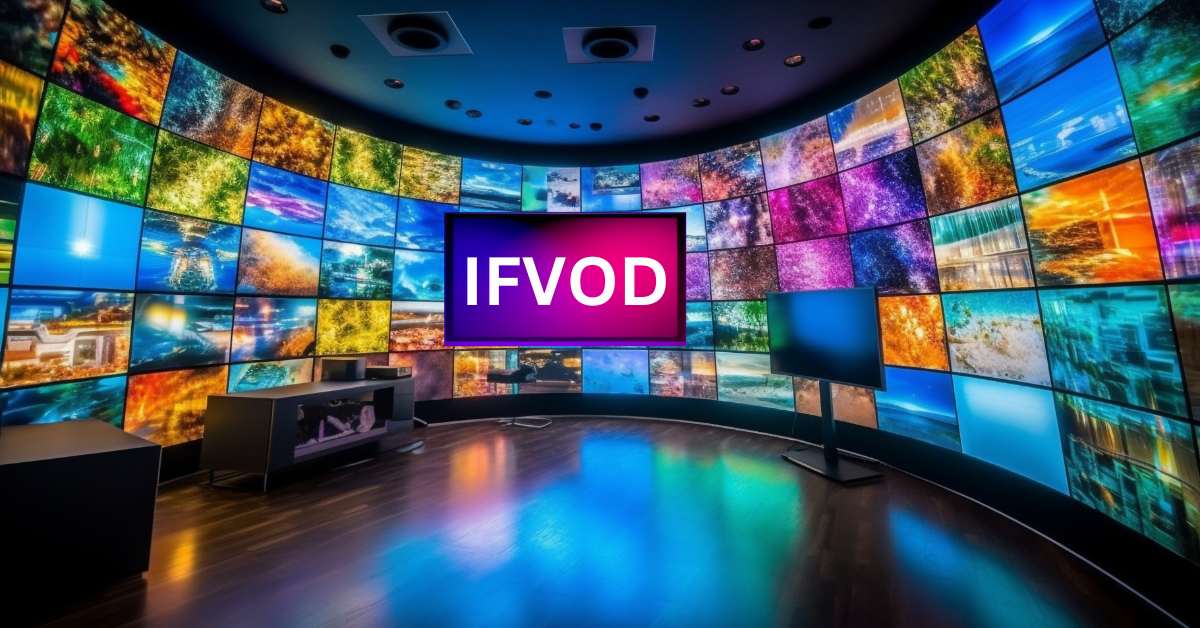Lights, camera, action! The entertainment world has undergone a significant revolution in recent years, thanks to the rise of streaming services. From binge-watching our favorite shows to discovering new movies at the click of a button, streaming has become an integral part of our daily lives. And now, there’s a new player on the scene: IfVOD.
IfVOD – short for “Individualized For Video On Demand” – is a cutting-edge streaming model that promises to take our viewing experience to new heights. But what exactly is IfVOD? How does it compare to other streaming services? And what does its future hold in the ever-evolving entertainment industry?
In this blog post, we will dive deep into the world of IfVOD and explore its benefits and drawbacks. So grab your popcorn and prepare for an immersive journey through the fascinating realm of on-demand video!
Contents
What is IfVOD?
What is IfVOD? It’s a question that might be lingering in your mind as you stumble upon this acronym. Well, fear not! Let’s unravel the mystery together.
IfVOD stands for Individualized For Video On Demand – a streaming model that takes personalization to the next level. Unlike traditional streaming services, where everyone watches the same content simultaneously, IfVOD allows users to customize their viewing experience based on their preferences and interests.
Imagine having a virtual video library explicitly tailored to your tastes. With IfVOD, you can choose what you want to watch and when you want to watch it. Whether it’s an action-packed blockbuster or a heartwarming romantic comedy, IfVOD covers you.
But here’s where things get interesting: IfVOD continues beyond simply curating content for you. It also learns from your viewing habits and makes recommendations based on past choices. This means that over time, IfVOD becomes more attuned to your preferences and presents you with a selection of movies and shows likely to captivate your attention.
Gone are the days of endlessly scrolling through countless titles to find something worth watching. With IfVOD, it’s all about personalized recommendations tailored just for you.
So, how does this magical customization happen? Through advanced algorithms and machine learning techniques, IfVOD analyzes data such as previous views, genre preferences, ratings given by similar users, and even external factors like trending topics or events happening worldwide.
The result? A personalized streaming experience like no other. You will no longer feel overwhelmed by an overwhelming sea of options; each recommendation feels like a hand-picked gem waiting for you to discover it.
Understanding the Different Models of IfVOD
IfVOD, or Individualized Free Video on Demand, is a relatively new concept in streaming services. Unlike traditional video-on-demand platforms that offer a fixed library of content, IfVOD allows users to customize their viewing experience by selecting specific shows or movies from a vast catalog.
One model of IfVOD is the pay-per-view option, where users can rent or purchase individual titles for a set price. This gives viewers the flexibility to watch what they want when they want without committing to a subscription plan.
Another model is the ad-supported version of IfVOD. In this case, users can access free content but are subjected to ads during their viewing experience. While this may be inconvenient for some, it allows for more accessibility and affordability than other streaming platforms.
Additionally, some hybrid models combine elements from different streaming services. For example, some IfVOD platforms offer subscription-based plans and pay-per-view options for exclusive or premium content.
Each model has its benefits and drawbacks depending on user preferences and needs. The pay-per-view model provides flexibility but can quickly become costly if you frequently watch new releases. On the other hand, ad-supported options may be more affordable but interrupt your viewing with advertisements.
Understanding these different models will help consumers decide which type of IfVOD service best suits their entertainment needs and budget constraints.
Pros of IfVOD
IfVOD, or Interactive Video on Demand, is a revolutionary concept in streaming services. It allows users to choose and interact with their watching content, creating an immersive and personalized viewing experience. So, what are some of the benefits of IfVOD?
- One of the significant pros of IfVOD is its interactivity. Unlike traditional streaming services, where you passively watch content, IfVOD allows you to shape the storyline actively. You can choose different paths or outcomes within a video, making each viewing session unique.
- Another advantage of IfVOD is its ability to enhance engagement and user involvement. Giving viewers control over certain aspects of the content creates a sense of agency and empz owers them as active participants rather than mere spectators.
- Furthermore, IfVOD allows creators to experiment with storytelling techniques and explore new narrative possibilities. This opens up a whole world of creativity and innovation in filmmaking.
- Additionally, IfVOD has excellent potential for educational purposes. It enables educators to develop interactive lessons and simulations that can significantly enhance learning experiences by allowing students to engage directly with the material.
- From a business standpoint, IfVOD presents exciting prospects for marketers and advertisers who can incorporate interactive elements into their campaigns to captivate audiences in previously unimaginable ways.
There are numerous advantages associated with IfVOD – from increased interactivity and engagement to endless creative possibilities – making it an exciting development in entertainment.
Cons of IVF
1. Limited Content Selection: One drawback of IfVOD is the limited content selection compared to traditional streaming services like Netflix or Hulu. While many options are available, the platform does not offer certain movies or TV shows you’re interested in.
2. Cost Accumulation: Another downside is the potential for cost accumulation with IfVOD. Unlike subscription-based services, where you pay a fixed monthly fee, IfVOD charges per view or rental basis, which can add up quickly if you frequently watch movies or binge-watch multiple TV show seasons.
3. Internet Connectivity Dependency: Since IfVOD relies on an internet connection to stream content, it’s essential to have a stable and fast internet connection for an uninterrupted viewing experience. This could be problematic for individuals with poor network coverage or when internet outages occur.
4. Advertisement Interruptions: Some IfVOD platforms include advertisements within their content, even though users pay for individual views or rentals. These interruptions can disrupt the flow and immersive experience while watching your favorite movie or TV show.
5. Lack of Offline Viewing Option: Unlike some streaming services that allow offline downloads, most IfVOD platforms still need to offer this feature. This means you need an active internet connection to access your rented/viewed content, making traveling inconvenient without reliable Wi-Fi access.
6. Licensing Restrictions: Due to licensing restrictions and agreements between studios and distributors, certain popular movies or TV shows may not be available on all IfVOD platforms at once. This limitation leads to fragmented availability across different providers and can make it challenging to find specific titles easily.
Considering these drawbacks before fully committing to an IfVOD service is essential, as they might impact your viewing experience.
How Does IfVOD Compare to Other Streaming Services?
From well-established giants like Netflix and Amazon Prime Video to newer players like Disney+ and Hulu, consumers have a wide range of choices regarding their entertainment needs.
IfVOD, or Individualized Free Video on Demand, is a relatively new player in this crowded market. Unlike traditional streaming platforms that offer a catalog of movies and TV shows for a monthly fee, IfVOD takes a different approach.
Instead of paying for access to an entire content library, IfVOD allows users to pay only for the specific videos they want to watch. This model gives users more control over their viewing experience by eliminating the need for subscriptions or monthly fees.
One significant advantage that sets IfVOD apart from other streaming services is its flexibility. Users can choose exactly what they want to watch without being tied down by a subscription plan. This means that if you’re only interested in watching one particular movie or show, you don’t have to commit to paying for an entire month’s worth of content.
Another benefit is cost savings. With traditional streaming services requiring monthly payments regardless of usage, IfVOD offers a more budget-friendly option. You only pay for what you watch, which can be especially appealing if you’re on a tight budget or prefer avoiding recurring charges on your credit card statement.
However, it’s important to note that IfVOD also has some drawbacks. One potential downside is limited selection compared to larger streaming platforms. While popular titles may be available on multiple platforms, smaller independent films or niche genres might be harder to find on an individualized service like IfVOD.
Additionally, because the payment model relies on individual purchases rather than subscriptions, costs can add up quickly if you frequently use the service and consume multiple videos per week or month.
Future of IfVOD in the Entertainment Industry
As technology advances, the future of IfVOD (Individualized Video on Demand) looks bright in the entertainment industry. With its unique model that allows users to personalize their viewing experience, IfVOD has gained popularity among consumers. But what does the future hold for this innovative streaming service?
One potential trend is an increase in content diversity on IfVOD platforms. As more and more creators see the benefits of reaching a global audience, they may release their content exclusively on IfVOD rather than through traditional distribution channels.
Additionally, with advancements in artificial intelligence and machine learning, IfVOD platforms could provide even more personalized recommendations to users based on their viewing history and preferences. This would enhance user satisfaction by offering curated content tailored to individual tastes.
Moreover, as internet speeds continue to improve globally, we can anticipate better streaming quality for IfVOD services. This means viewers can enjoy high-definition content without buffering issues or interruptions.
Furthermore, collaborations between IfVOD platforms and other industries could shape its future. For example, partnerships with gaming companies lead to interactive experiences where viewers can participate or influence storylines while watching a show or movie.
Despite these promising developments, some challenges need addressing for the continued success of IfVOD. One such challenge is piracy and copyright infringement. As exclusive content becomes more prevalent on these platforms, it becomes crucial for providers to implement robust security measures against unauthorized sharing and distribution.
Another issue is competition from established streaming giants like Netflix and Amazon Prime Video. These platforms already have vast libraries of popular shows and movies which attract subscribers worldwide. To stay relevant in this highly competitive market, IfVOD providers must continuously innovate by offering unique features unavailable elsewhere.
Conclusion
After exploring the benefits and drawbacks of IfVOD, it is clear that this emerging entertainment industry trend has advantages and disadvantages. With the ability to access a vast library of content at any time and from any location, IfVOD offers convenience and flexibility to viewers. Additionally, the personalized recommendations based on individual preferences enhance the overall streaming experience.
However, it’s essential to acknowledge some of the challenges associated with IfVOD. The lack of ownership over content can frustrate those who prefer physical copies or worry about potential loss if a streaming service shuts down. Moreover, subscription costs can add up quickly when subscribing to multiple platforms.
When comparing IfVOD to other streaming services like traditional VOD or linear TV, each model has strengths and weaknesses. While traditional VOD allows immediate access but limited content selection, linear TV provides scheduled programming but lacks on-demand options. In contrast, IfVOD combines elements from both models by offering a wide range of content available at any time.
Looking ahead, it is evident that IfVOD will continue to grow in popularity as more consumers embrace digital streaming platforms. We can expect even more innovations as technology advances and internet connectivity improves worldwide. However, it remains essential for providers to address concerns such as licensing agreements and pricing structures.
Latest Posts!



